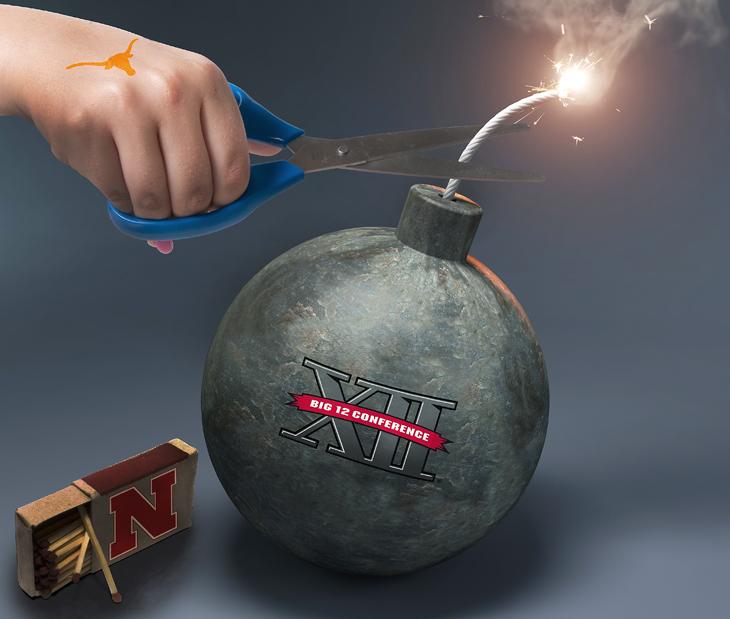Texas passes on Pac-10, Big 12 to remain intact
June 14, 2010
The University of Texas announced Monday it would remain a member of the Big 12 Conference despite previous reports it would accept an invitation to join the Pac-10.
The announcement from Texas will likely save the Big 12, previously in danger of falling apart when the Pac-10 invited five of its schools — Texas, Texas A&M, Texas Tech, Oklahoma and Oklahoma State — to form a new 16-team super-conference. Oklahoma, Texas A&M and Oklahoma State also announced Monday that they would remain in the Big 12.
“The decision to stay in the Big 12 represents a consensus position which resulted from a collaborative effort with our colleagues in the conference,” Oklahoma President David L. Boren and Vice President and Director of Athletics Joe Castiglione said in statement to the Associated Press. “We value the strong working relationship that has been reaffirmed during this process among the conference members. We intend to work very hard to make the conference as lasting and dynamic as possible. We appreciate the respect and interest that has been shown to OU during this process.”
Texas’ decision to stay in the Big 12 reportedly came when the Big 12 commissioner proposed that a 10-team conference would have increased television revenue and exposure. Beebe’s new deal would include a potential payoff between $20 and $25 million for Texas, Oklahoma and Texas A&M, while the other seven schools would receive nearly double the revenue they do now, according to the AP.
Also as a part of the deal, Texas would retain rights to create its own TV network, something the Pac-10 did not offer the school.
The schools’ decision to remain a part of the Big 12 means Iowa State will remain in a BCS conference. Had the five schools bolted for the Pac-10, the conference likely would have crumbled and the remaining Big 12 schools — Iowa State, Kansas, Kansas State, Missouri and Baylor — would have been without a conference allegiance.
The loss of the Big 12 tie would have had a significant impact on some of Iowa State’s premier programs, including wrestling, women’s basketball and volleyball, as well as all of the non-revenue sports.
“I think it’s a great thing that the Big 12 is staying together,” said Jon Reader, wrestler and senior in management. “There are four elite programs [in wrestling] that are always in the top 10 each year, and I think that that strong of a conference is a great thing to keep alive. The Big 12 is strong.”
The departure of Colorado and Nebraska means the Big 12 will likely be forced to forego its championship game in football as NCAA rules state that conferences must have 12 teams to have such a game. The conference has the option to appeal the NCAA rule and keep its championship game, but it is more likely that it will switch to a nine-game, round robin schedule similar to the one used by the Pac-10.
The loss of Nebraska means that annual matchups with the Cornhuskers in sports such as football and basketball are no longer likely, but in other sports, matchups are still a likely possibility.
The Cornhuskers won’t start play in the Big 10 until the 2011-2012 academic year, while Colorado likely won’t be a member of the Pac-10 until 2012-2013, according to various reports.
“Directly, [Nebraska’s departure] won’t affect my senior year, but with the current athletes [who] are younger than me, Nebraska is still going to be an elite program, they always are and they always will be,” Reader said. “Unfortunately they’re leaving the Big 12 but I’m glad to hear that the Big 12 is going to still be alive.”
The change in the conference makeup and the increased revenue numbers likely won’t impact non-revenue sports such as track and field and tennis as much as the high-dollar sports such as football and men’s basketball. For that reason, one coach said it is unlikely any change would affect how those programs go about their day-to-day activities.
“Whatever conference we’re in, we’re going to try and get to nationals and do well at the national meets,” said Corey Ihmels, track and field coach.
Ihmels was a student-athlete at Iowa State when the school was a part of the Big Eight, but his senior season was the first year of Big 12 competition.
The biggest change from the Big Eight to the Big 12, Ihmels said, has been the depth of competition in the conference and that little has changed in 15 years.
“It doesn’t change what we’re trying to do,” Ihmels said. “It doesn’t change what we’re trying to accomplish. All of that other stuff will sort itself out.”
Iowa State University President Gregory Geoffroy and Athletic Director Jaime Pollard were not available for comment.
— Jake Calhoun contributed to this article.

















